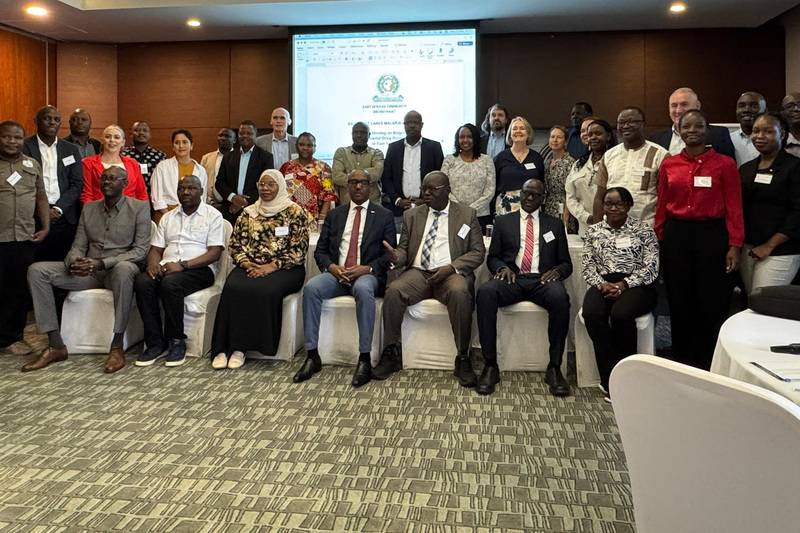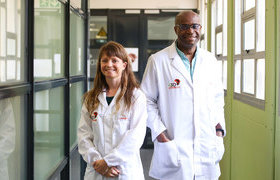MARC SE-Africa drives adoption of plan to tackle malaria drug resistance in East Africa
21 May 2025 | Story Supplied. Photo Supplied. Read time 5 min.
A University of Cape Town (UCT)-led research consortium has played a key role in developing the first regional plan to fight drug-resistant malaria in East Africa. Endorsed by health ministers from across the East African region, the plan enables countries to collaborate in protecting the effectiveness of life-saving malaria treatments.
This comes at a time when resistance is growing, and funding for malaria control is under pressure. The action plan was developed in partnership with the East African Community’s (EAC) Roll Back Malaria Secretariat, and its national malarial programmes and their partners. It supports optimised malaria treatment, stronger surveillance, and long-term regional cooperation to ensure effective treatment and limit the spread of resistance across Africa.
On 9 May 2025, 25th Ordinary Meeting of the EAC Sectoral Council of Ministers of Health formally endorsed the Regional Detailed Action Plan for Responding to Antimalarial Drug Resistance in East Africa. This milestone decision marks a major step toward more coordinated and effective malaria case management in one of the most burdened regions in the world. The action plan lays critical groundwork for coordinated, evidence-based, regional responses to the growing threat of drug-resistant malaria, which has recently also been detected in southern Africa.
A united front
The action plan was developed through a collaborative effort led by UCT’s Mitigating Antimalarial Resistance Consortium in South-East Africa (MARC SE-Africa), in close partnership with the EAC Roll Back Malaria Secretariat, led by Dr Michael Katende. This inclusive process involved national malaria programmes from all EAC member states and their partners, as well as leading global health institutions such as the Global Fund, the President’s Malaria Initiative, the Clinton Health Access Initiative, the African Leaders Malaria Alliance and Medicines for Malaria Venture. At a time when many African countries face sharp reductions in external public health funding, this initiative signals the urgency and strength of a united regional response against this growing threat. By generating solutions from within the continent and combining technical and political leadership across borders, African institutions are taking charge of safeguarding malaria treatment for the future.
“UCT remains committed to fostering solutions that not only assist our East African neighbours but also provide a template for responses to drug resistant malaria in other African regions.”
“This is a landmark achievement,” said Dr Stephanie van Wyk, senior researcher at UCT and technical advisor within the consortium. “This endorsement reflects the potential realised when scientific evidence, political will, and regional solidarity converge. UCT remains committed to fostering solutions that not only assist our East African neighbours but also provide a template for responses to drug resistant malaria in other African regions. By enhancing case management and proactively addressing resistance challenges through regional collaboration, we contribute to safeguarding the effectiveness of antimalarial treatments throughout the endemic regions of Southern Africa.”
Research-driven plan
By synthesising the latest evidence on resistance patterns and treatment efficacy, the UCT-led team partnered with the EAC to support the consensus-based development of the first regional roadmap of its kind. The plan outlines specific priorities for optimised treatment policies, and supply chain management to address the growing threat of drug-resistant Plasmodium falciparum, particularly resistance to artemisinin-based combination therapies (ACTs), the cornerstone of malaria treatment.
“Malaria knows no borders, and neither should our response.”
Professor Karen Barnes, lead of MARC SE-Africa and coordinator of the initiative at UCT, emphasised the significance of this decision.
“Malaria knows no borders, and neither should our response. This consensus-based regional action plan demonstrates the power of multinational collaboration in tackling drug-resistant malaria. Now is the critical moment for East African nations and international partners to commit to sustained action and ensure effective malaria treatment remains available for millions at risk.”
A regional response for millions at risk
Over 300 million people, more than 80% of the EAC region’s population, live at risk of malaria. The growing threat of drug-resistance calls for urgent, regionally coherent strategies to preserve treatment efficacy and prevent reversal of substantial reductions in malaria cases and deaths since ACTs were introduced. The action plan provides such a framework, summarises current evidence on drug resistance in the region, and outlines evidence-based short- and medium-term interventions to tackle this threat.
The initiative comes at a time of declining international funding for malaria control, reinforcing the need for African-led solutions. Through this effort, East Africa demonstrates regional leadership and a commitment to protecting gains made in malaria control.
 This work is licensed under a Creative Commons Attribution-NoDerivatives 4.0 International License.
This work is licensed under a Creative Commons Attribution-NoDerivatives 4.0 International License.
Please view the republishing articles page for more information.










